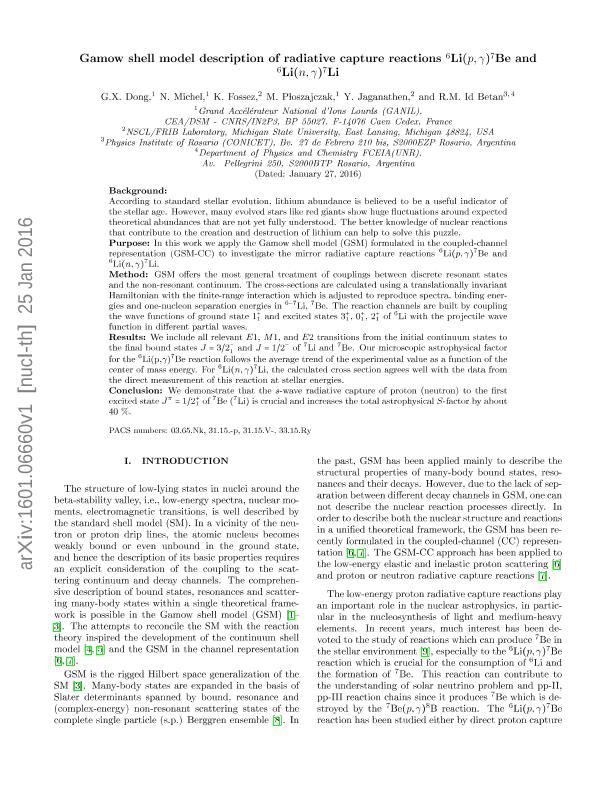Mostrar el registro sencillo del ítem
dc.contributor.author
Dong, G.X.
dc.contributor.author
Michel, N.
dc.contributor.author
Fossez, K.
dc.contributor.author
Ploszajczak, M.
dc.contributor.author
Jaganathen, Y.
dc.contributor.author
Id Betan, Rodolfo Mohamed

dc.date.available
2018-06-28T19:07:43Z
dc.date.issued
2017-03
dc.identifier.citation
Dong, G.X.; Michel, N.; Fossez, K.; Ploszajczak, M.; Jaganathen, Y.; et al.; Gamow shell model description of radiative capture reactions 6Li(p, γ)7Be and 6Li(n, γ)7Li; IOP Publishing; Journal Of Physics G-nuclear And Particle Physics; 44; 4; 3-2017; 1-12
dc.identifier.issn
0954-3899
dc.identifier.uri
http://hdl.handle.net/11336/50470
dc.description.abstract
Background. According to standard stellar evolution, lithium abundance is believed to be a useful indicator of the stellar age. However, many evolved stars like red giants show huge fluctuations around expected theoretical abundances that are not yet fully understood. The better knowledge of nuclear reactions that contribute to the creation and destruction of lithium can help to solve this puzzle. Purpose. In this work we apply the Gamow shell model formulated in the coupled-channel representation to investigate the mirror radiative capture reactions 6Li(p, γ)7Be and 6Li(n, γ)7Li. Method. The cross-sections are calculated using a translationally invariant Hamiltonian with the finite-range interaction which is adjusted to reproduce spectra, binding energies and one-nucleon separation energies in 6-7Li, 7Be. The reaction channels are built by coupling the wave functions of ground state and excited states ,31+,01+,21+ of 6Li with the projectile wave function in different partial waves. Results. We include all relevant E1, M1, and E2 transitions from the initial continuum states to the final bound states and of 7Li and 7Be. Our microscopic astrophysical factor for the 6Li(p, γ)7Be reaction follows the average trend of the experimental value as a function of the center of mass energy. For6(n,γ)Li, the calculated cross section agrees well with the data from the direct measurement of this reaction at stellar energies. Conclusion. We demonstrate that the s-wave radiative capture of proton (neutron) to the first excited state Jπ = 1+ of 7Be (7Li) is crucial and increases the total astrophysical S-factor by about 40%.
dc.format
application/pdf
dc.language.iso
eng
dc.publisher
IOP Publishing

dc.rights
info:eu-repo/semantics/openAccess
dc.rights.uri
https://creativecommons.org/licenses/by-nc-sa/2.5/ar/
dc.subject
Lithium Abundance
dc.subject
Radiative Capture
dc.subject
Scattering Theory
dc.subject
Stellar Hydrogen Burning
dc.subject.classification
Astronomía

dc.subject.classification
Ciencias Físicas

dc.subject.classification
CIENCIAS NATURALES Y EXACTAS

dc.title
Gamow shell model description of radiative capture reactions 6Li(p, γ)7Be and 6Li(n, γ)7Li
dc.type
info:eu-repo/semantics/article
dc.type
info:ar-repo/semantics/artículo
dc.type
info:eu-repo/semantics/publishedVersion
dc.date.updated
2018-06-26T22:22:53Z
dc.journal.volume
44
dc.journal.number
4
dc.journal.pagination
1-12
dc.journal.pais
Reino Unido

dc.journal.ciudad
Londres
dc.description.fil
Fil: Dong, G.X.. Grand Accélérateur National d’Ions Lourds; Francia
dc.description.fil
Fil: Michel, N.. Grand Accélérateur National d’Ions Lourds; Francia
dc.description.fil
Fil: Fossez, K.. Michigan State University; Estados Unidos
dc.description.fil
Fil: Ploszajczak, M.. Grand Accélérateur National d’Ions Lourds; Francia
dc.description.fil
Fil: Jaganathen, Y.. Michigan State University; Estados Unidos
dc.description.fil
Fil: Id Betan, Rodolfo Mohamed. Consejo Nacional de Investigaciones Científicas y Técnicas. Centro Científico Tecnológico Conicet - Rosario. Instituto de Física de Rosario. Universidad Nacional de Rosario. Instituto de Física de Rosario; Argentina
dc.journal.title
Journal Of Physics G-nuclear And Particle Physics

dc.relation.alternativeid
info:eu-repo/semantics/altIdentifier/doi/http://dx.doi.org/10.1088/1361-6471/aa5f24
dc.relation.alternativeid
info:eu-repo/semantics/altIdentifier/url/http://iopscience.iop.org/article/10.1088/1361-6471/aa5f24/meta
dc.relation.alternativeid
info:eu-repo/semantics/altIdentifier/url/https://arxiv.org/abs/1601.06660
Archivos asociados
